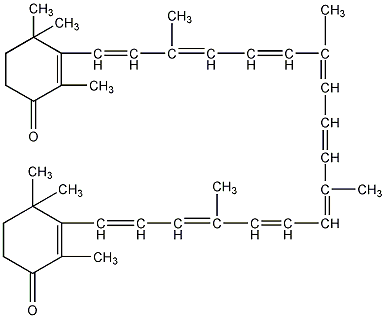Canthaxanthin (trans)


Structural formula
| Business number | 05B6 |
|---|---|
| Molecular formula | C40H52O2 |
| Molecular weight | 564.84 |
| label |
β-Carotin-4,4′-dione, E 161g |
Numbering system
CAS number:514-78-3
MDL number:MFCD00016364
EINECS number:208-187-2
RTECS number:FI0330000
BRN number:1898520
PubChem ID:None
Physical property data
1. Character:Undetermined
2. Density (g/ cm3,25/4℃): Undetermined
3. Relative vapor density (g/cm 3,AIR=1): Undetermined
4. Melting point (ºC):210
5. Boiling point (ºC,Normal pressure): Undetermined
6. Boiling point (ºC,8kPa): Undetermined
7. Refractive index: Undetermined
8. Flash Point (ºF): Undetermined
9. Specific optical rotation (º): Undetermined
10. Autoignition point or ignition temperature (ºC): Undetermined
11. Vapor pressure (kPa,25ºC): Undetermined
12. Saturation vapor pressure (kPa,60ºC): Undetermined
13. Heat of combustion (KJ/mol): Undetermined
14. Critical temperature (ºC): Undetermined
15. Critical pressure (KPa): Undetermined
16. Oil and water (octanol/Log value of water) partition coefficient: Undetermined
17. Explosion limit (%,V/V): Undetermined
18. Lower explosion limit (%,V/V): Undetermined
19. Solubility:Insoluble in water
Toxicological data
1. Acute toxicity: Oral administration to adult men TDLo: 86 mg/kg/15W-I, retinal changes (pigmentation);
Mouse oral LD50: 10gm/kg, no details except lethal dose;
Ecological data
Generally not hazardous to water, do not discharge material into the surrounding environment without government permission.
Molecular structure data
1、 Molar refractive index:186.19
2、 Molar volume(m3/mol):563.1
3、 Isotonic specific volume (90.2K):1410.3
4、 Surface tension(dyne/cm):39.3
5、 Polarizability(10-24cm3):73.81
Compute chemical data
1. Reference value for hydrophobic parameter calculation (XlogP): 11.4
2. Number of hydrogen bond donors: 0
3. Number of hydrogen bond acceptors: 2
4. Number of rotatable chemical bonds: 10
5. Number of tautomers: 3
6. Topological molecule polar surface area 34.1
7. Number of heavy atoms: 42
8. Surface charge: 0
9. Complexity: 1270
10. Number of isotope atoms: 0
11. Determine the number of atomic stereocenters: 0
12. Uncertain number of atomic stereocenters: 0
13. Determine the number of chemical bond stereocenters: 9
14. Number of uncertain chemical bond stereocenters: 0
15. Number of covalent bond units: 1
Properties and stability
A carotenoid pigment. Dark purple crystal or crystalline powder. Melting point is about 210℃(decomposition). Unstable to oxygen and light. It needs to be stored in a light-shielding container filled with inert gas. Soluble in chloroform (10%). Slightly soluble in vegetable oil (0.005%) and acetone (0.03%). Insoluble in water, ethanol and propylene glycol. Stable industrial products are available as solutions in greases or organic solvents, or as water-dispersible orange to red powders or granules. After coloring, the color tone is not affected by pH value, is quite stable to sunlight, and does not fade easily.
Natural products are found in certain mushrooms, crustaceans, fish, algae, eggs, blood, liver, etc.
Storage method
Stored in a cool, dry, well-ventilated warehouse. Keep away from fire and heat sources. Protect from direct sunlight. The packaging is sealed. They should be stored separately from acids and food chemicals, and avoid mixed storage. Suitable materials should be available in the storage area to contain spills.
Synthesis method
Originated from the oxidation of β-carotene.
Purpose
Edible orange pigment is used as beverages, ice cream, waffles and other auxiliary-free biscuits and sauces, tomato processed products, meat processed products, etc. Add an appropriate amount to white cake pre-made flour to bring out apricot tones, and the pigment residue rate after baking can reach 96%. Adding 11 mg/kg to pork sausage can give the same color as beef products.